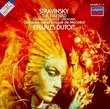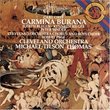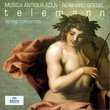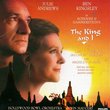Some of Solomon's finest!
SwissDave | Switzerland | 01/08/2008
(5 out of 5 stars)
"Testament's are the finest remasterings of Solomon's Beethoven yet. The sound (one must assume of the master tapes) is variable, but it's full-bodied, colourful and clean where it counts most: in the great recordings of the Op. 109 and 110 sonatas (from 1951 and 1956, respectively).
It's true that in the 1954 recording of the Appassionata the awesome digital clarity gets muffled a bit (I ultimately enjoy the videotaped version of two years later more, as there, to see the man play compensates a bit for the sound). Neither is this my favourite Appassionata (those would be Richter's live in Moscow 1960, and the studio recordings by Moravec, from 1962, and Schnabel, from 1933). None of these recordings is so similar to the other as to replace the others, though, and there is always the one aspect about Solomon that baffles most: seemingly doing nothing, he achieves everything. Not Richter's or Schnabel's furor, but clarity and balance, and an evenness across all registers one looks for in vain elsewhere. Solomon is the only pianist who literally makes me forget who's playing and listen to the music as if it were playing itself.
In Op. 101 (also from 1954 but a bit more cleanly recorded), the slow movements come off best, whereas the faster ones border on the mechanically fleet at times. There are recordings I prefer here, such as Levy's (1958), Schnabel's (1934), Kempff's later one (from 1964/65) and Arrau's (from 1965). But again, Solomon is a master at making the score speak for itself.
Solomon's Op. 109 and 110 are, along with his inevitable Hammerklavier and more, among the highpoints of his legacy and the Beethoven discography (to put it another way, both interpretations "speak" to me in a way neither of his two recordings of Op. 111 do), and they have never sounded better than here. Again, there are other recordings I wouldn't want to be without, Schnabel's in particular. Those looking for a stereo recording of Op. 109 may want to consider Hungerford's (1967, I believe) and Frank's (1971) studio recordings. I seriously cannot think of a stereo recording of Op. 110 that gives me the same satisfaction as Schnabel's and Solomon's, but there is always Gulda (most fun live in Montpellier in 1993), Hungerford, Frank, Serkin, and Arrau (whose late Beethoven I love in general, but whom some find slightly heavy-gaited in Op. 110, and didactic in Op. 109). Collectors of historic recordings take note that Edwin Fischer's Op. 110 from 1938 is another discographic staple.
In sum, this reissue deserves nothing but the highest possible recommendation - you may well come to the conclusion that there are no interpretations of Op. 109 and 110 you cherish more than these. What you get here transcends great pianism: this is eternally nourishing soul food.
Greetings from Switzerland, David."
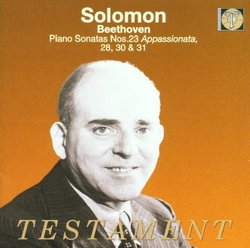

 Track Listings (14) - Disc #1
Track Listings (14) - Disc #1